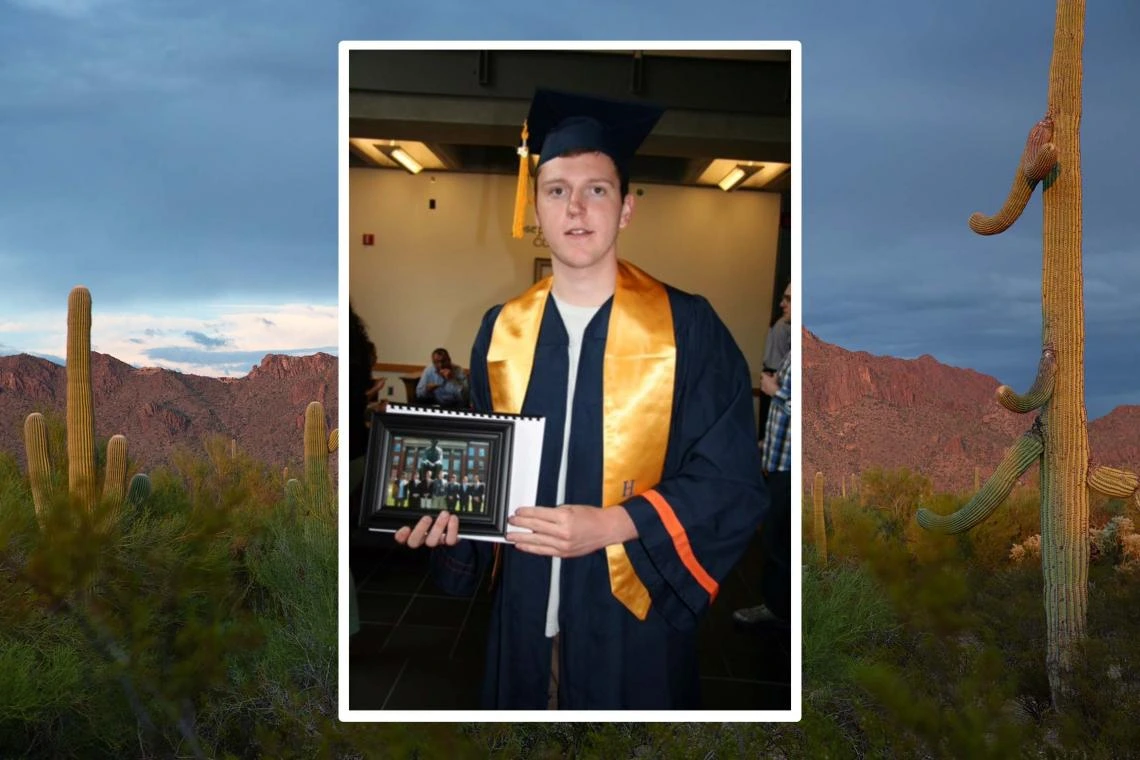Honoring A Life Lived In Love, Laughter: Joseph Smeeding Memorial Scholarship
The late Joe Smeeding ’15 loved making people laugh so life could feel a little easier — even through two years of intense treatment for glioblastoma multiforme, a fast-acting brain cancer that took his life, at age 26, in January 2018.

Now, to celebrate Smeeding and continue to ease the lives of others, his family has established the Joseph Smeeding Memorial Scholarship at the University of Arizona’s Eller College of Management.
“Joe lived a good life, just too damn short,” says his mother Mary Ann Laubacher, a retired registered nurse who cared for her youngest son throughout his treatment. “I know what love is because that’s all Joe ever wanted to convey. He recognized the humanity in every person, and he was always the funniest, smartest and kindest guy in the room. For me, creating this endowment ensures his legacy—Joe’s life mattered, he lives on.”
The endowed scholarship will be awarded annually to an Eller student enrolled in the master’s or doctoral program in economics — the same programs Joe pursued as a graduate student. Eligible students may apply beginning in spring 2022 for a scholarship award to be used toward educational expenses, including tuition, books and fees, for the following academic year.
“During his time in the program, Joe positively impacted the lives of numerous Eller students and professors,” says Martin Dufwenberg, Eller professor of economics and economics department head. “With the establishment of the Joseph Smeeding Memorial Scholarship, his legacy will continue to impact the department of economics and our students for generations to come.”
Smeeding, who earned a bachelor’s in economics at Syracuse University, chose the Eller College for graduate school for its behavioral economics program.
“He was interested in social mobility, equity and minority advancement,” says Tim Smeeding, Joe’s father and the Lee Rainwater Distinguished Professor of Public Affairs and Economics at the University of Wisconsin-Madison. “I was really happy he was going to go into economics like I did, and Arizona was the program that best met his needs and preferences. He passed his exams and was looking for a thesis topic — and then brain cancer hit.”
Until that point, Smeeding had a fairly typical graduate student experience — serving as a teaching assistant, hiking Mount Lemmon and socializing with friends on University Boulevard.
“Joe always had a relaxed mentality — he never allowed exams or projects to stress him out,” says Jackson Dorsey ’15 ’18, one of Smeeding’s former classmates and an assistant professor of business economics and public policy at Indiana University Bloomington. “He was intelligent, calm and sensible, and he had a great sense of humor.”
Devdeepta Bose ’18, a postdoctoral scholar in economics at the California Institute of Technology and another of Smeeding’s former classmates, agrees, calling him “brilliant, a free thinker and joyous.”
“He didn’t let the rigors of graduate school consume his life,” Bose says. “Some of that may have been driven by his off-the-chart technical abilities, but his insistence on playing basketball for the rec team, or riding around on his scooter, ultimately made him a better student, and certainly a more interesting friend.”
In the same way, Smeeding never let his illness consume him, instead maintaining a positive mindset that perhaps helped to extend his life nearly two times what is typical for glioblastoma patients. Most don’t make it past one year, and Smeeding lived nearly two years post-diagnosis.
“He practiced mindfulness,” Laubacher says, noting Smeeding always found joy in the love he had for his family, friends and basketball—even garnering enough energy to watch a game the night before he passed. “He didn’t worry about next week, he just focused on today. We always have today.”
April 6, 2021, marked what would have been Smeeding’s 30th birthday. To celebrate his life and honor his passing, his family is opening up the opportunity for those who knew him to contribute to the scholarship fund in his memory.
“Arizona, more than anything else, was Joe’s place — his own adventure,” Laubacher says, “but the tumor destroyed his opportunity at Eller. Joe was bright and creative and would have done something great, but that wasn’t meant to be. So now this fund is to inspire other Eller graduate students to carry on and be their best and do their best. I’m hopeful that these young people will make the world a better place — because that’s what Joe would have done.”
This story originally appeared on the Eller College of Management website.

